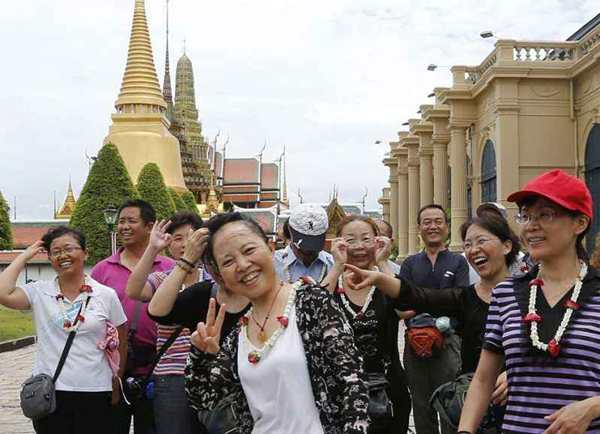

 |
| Chinese tourists in Thailand (File photo) |
Tourism has lately been increasing between China and other "Belt and Road" countries, thanks to enhanced cooperation between the involved nations.
In 2017, an estimated 25 million trips will be made from China to countries participating in the Belt and Road Initiative, according to China's largest online travel agency, Ctrip.com. Meanwhile, more and more tour guides are learning Chinese in order to meet the increased demand for Chinese-speaking tour guides.
In a report summarizing "Belt and Road" tourism in 2016, Ctrip noted that Chinese tourists were able to travel to over 20 "Belt and Road" countries visa-free or with only entry visas upon arrival.
The company said it provided service to over 7 million inbound visitors in 2016, up 40 percent from 2015. About 3 million trips were made to China from countries along the "Belt and Road" route, a 50 percent rise from 2015. Some 150 million trips are expected to be made from China to those countries between 2016 and 2020, with spending likely to top $200 billion, according to China National Tourism Administration.
Thailand, Singapore and Malaysia were the top three destinations in the "Belt and Road" region for Chinese travelers, the report stated.
 Fire brigade in Shanghai holds group wedding
Fire brigade in Shanghai holds group wedding Tourists enjoy ice sculptures in Datan Town, north China
Tourists enjoy ice sculptures in Datan Town, north China Sunset scenery of Dayan Pagoda in Xi'an
Sunset scenery of Dayan Pagoda in Xi'an Tourists have fun at scenic spot in Nanlong Town, NW China
Tourists have fun at scenic spot in Nanlong Town, NW China Harbin attracts tourists by making best use of ice in winter
Harbin attracts tourists by making best use of ice in winter In pics: FIS Alpine Ski Women's World Cup Slalom
In pics: FIS Alpine Ski Women's World Cup Slalom Black-necked cranes rest at reservoir in Lhunzhub County, Lhasa
Black-necked cranes rest at reservoir in Lhunzhub County, Lhasa China's FAST telescope will be available to foreign scientists in April
China's FAST telescope will be available to foreign scientists in April "She power" plays indispensable role in poverty alleviation
"She power" plays indispensable role in poverty alleviation Top 10 world news events of People's Daily in 2020
Top 10 world news events of People's Daily in 2020 Top 10 China news events of People's Daily in 2020
Top 10 China news events of People's Daily in 2020 Top 10 media buzzwords of 2020
Top 10 media buzzwords of 2020 Year-ender:10 major tourism stories of 2020
Year-ender:10 major tourism stories of 2020 No interference in Venezuelan issues
No interference in Venezuelan issues
 Biz prepares for trade spat
Biz prepares for trade spat
 Broadcasting Continent
Broadcasting Continent Australia wins Chinese CEOs as US loses
Australia wins Chinese CEOs as US loses